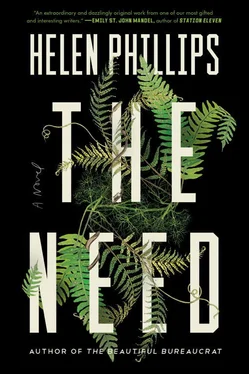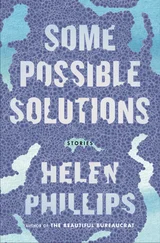“Yes,” Molly said, “yes, postpartum.”
If Erika hadn’t been there, she would have been unable to endure it—but Erika was there, locating the bottle opener, catching the cup an instant before it tipped off the table, reaching under the couch to retrieve Ben’s ball. And the children were enamored of the fish, their mad dashes through the rooms always lurching back around to her. They wanted to stroke her fins and scales. Molly didn’t blame them.
A bunch of the children, Viv included, had crawled under the gray quilt of the big bed, pretending it was a cave. Erika yanked the quilt off them, exposing them to the light and triggering a spurt of screams, but their indignation was replaced almost immediately by delight, for the fish had a long blue rope, and it was clear that they were now supposed to take hold of this rope and follow the fish to the ends of the earth. Erika led them through the rooms, collecting more children as she went, until the blue rope was a twisting eel of small humans. The fish cleared the living room rug of adults with a few insistent arm gestures. Molly hurried to her phone to cue David’s whale-sounds mix on the speakers. The human eel encircled the fish, and the performance began.
It was not much. Erika juggled three scarves. She gave each child a length of turquoise ribbon taped to a pencil. She had a bubble blower that produced twenty-plus bubbles with each breath. It was not much, yet the children were entranced, swirling around the room amid the bubbles, waving their turquoise ribbons, spinning to the sounds of the whales.
Soon after the fish show, the party fell apart. Viv lost interest in her peers and instead shadowed her mother, following her into the bathroom, where she intently watched her pee. As Molly pulled up her underwear and jeans, Viv said, “Phew, now I don’t have to look at your skeleton anymore.”
When they returned to the party, Viv wouldn’t stop muttering, “IloveyouMommyIloveyouMommy,” a mutter verging on a whine, leaving Molly equal parts touched and annoyed. Viv clung so hard to Molly’s leg as she searched for the misplaced birthday candles that eventually she had to shake her off.
Viv wept as everyone sang “Happy Birthday” (Erika bearing the platter of ocean-colored cupcakes she had baked yesterday with the kids), but refused to explain why. So absorbed was Molly in trying to ascertain the source of Viv’s angst that she didn’t notice Ben, straining to reach the lighter on the table, the beautiful green toy of it. It was Erika who scooped him up and away.
Molly lost track of Viv in the pandemonium of the cupcake distribution. She watched her own hands passing out cupcakes as though she were acting in a play in which a mother passes out cupcakes.
She was overseeing Ben’s dismemberment of his cupcake when Viv reappeared at her elbow, bearing on her flat palm that selfsame hand cast in plaster, a gift from their kindly dentist.
“Please,” Viv said, lifting the hand on her hand, “put this somewhere away from these noisy children.”
Erika took the hand and placed it atop the bookshelf with utmost care.
The hand was precious indeed, a darling souvenir, a sweet little preservation of time, Viv at age three and a half, yet the sight of it always chilled Molly. It looked like an object associated with a dead child. David agreed; between themselves they referred to it as Viv’s memento mori. Molly didn’t like having it on display, but Viv insisted.
When the first guests to leave opened the front door, a pair of the silver balloons somehow escaped the confines of the house. There was a light but adamant wind, and the balloons rose quickly, alarmingly so.
Viv knew, from The Why Book , what happens to balloons let loose in the sky. What they can do to sea creatures, and to birds.
“Call the 911!” she screamed. “Call the 911!”
The rest of the guests were escorted out to their cars by the mournful howls of the birthday girl. The fish held her as she cried.
Ben was asleep at the wrong time. He had crashed around 5:00 p.m., too late for a nap and too early for bed. Viv was sitting on the toilet watching The Nutcracker on the computer, as she had been for who knows how long. The exhausted aftermath of the party: Erika cleaning the kitchen (still in costume, to maintain the illusion for Viv), Molly bunching up wrapping paper and gathering snarls of ribbon and restoring the children’s room to order.
Molly fell into the hypnotic monotony of sorting intermingled puzzle pieces belonging to three different puzzles. Under other circumstances, she would have marveled, as she so often did when cleaning up toys, that this was how she was forced to spend her heartbeats; that this drudgery was part of love, part of the mission of mothering a human. Today, though, she appreciated the concreteness of the task, the mindlessness, the scattered evidence of the children’s vitality, the sound of Ben breathing in the crib.
On her way back out to the kitchen, she knelt in the hallway, endeavoring to peel off the floor a sparkly dolphin sticker that some kid had stomped onto the wood.
She looked up from her task, at the fish conquering the kitchen ten feet away from her, and then she knew.
The fish was attacking the kitchen just as Molly would have: first the countertop across from the sink, next the countertop to the left of the sink, next the countertop to the right of the sink. The empty beer bottles in a row on the windowsill, rinsed for recycling. A few squirts of the orange-clove spray on the countertops, an unnecessary flourish but somehow fortifying before confronting the hill of dishes in the sink.
“You can take the mask off now, don’t you think?” Molly said coldly.
The fish ignored the question.
Just then Viv emerged from the bathroom, and Molly was trapped: couldn’t snatch off the mask, couldn’t press Moll toward the door.
“I’m scared of the Sugar Plum Fairy,” Viv said. “I need warm milk to not be scared.”
Moll was already opening the fridge. She poured milk into a mug and zapped it in the microwave and stirred in vanilla extract and brought it to the table.
“Thanky, Fishy,” Viv said. But, putting the mug back down after her first sip, she missed the edge of the table.
Viv and Molly and the fish stared at the white explosion on the wooden floor, a many-pointed star sharp with ceramic shards.
It was the fish who shepherded Viv away from the mess. It was the fish who fetched the dustbin and the paper towels and the orange-clove spray.
Molly sat on the couch, holding Viv, who was still shaking from the shock of breaking something so completely. They watched the fish clean up the mess. She was methodical, meticulous, and it was mesmerizing. They observed how carefully she scanned the floorboards for splinters of ceramic, plucking each one up in a square of paper towel, like a person picking rare flowers.
“Mommy, are you hating me?” Viv said.
“There’s this phrase.” Molly squeezed Viv close. “ Don’t cry over spilled milk .”
“What’s phrase?” Viv said. “Who cried?”
The fish perked up, looked up, as though she wanted to answer Viv’s questions, all three of them, but then, remembering herself, she looked back down, returned her attention to the floor.
For the second night in a row, Molly went through Viv’s bedtime routine dreading the thing that awaited her on the other side of the door. Once again, the dread cast the light of the sacred upon the mundane: the glow of the night-light rendered the toothbrush and the toothpaste and the pajamas and the blanket golden, as though everything Viv touched took on a mystical sheen. Midas? Molly had enough wits about her to remember the name, though she couldn’t recall the moral.
Читать дальше





![Unknown - [Carly Phillips] The Bachelor (The Chandler Brothe(Bookos.org) (1)](/books/174132/unknown-carly-phillips-the-bachelor-the-chandle-thumb.webp)






